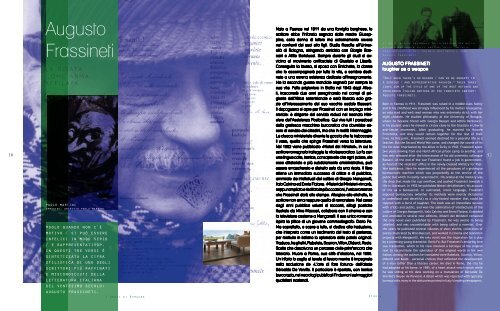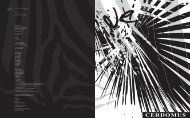You also want an ePaper? Increase the reach of your titles
YUMPU automatically turns print PDFs into web optimized ePapers that Google loves.
[8<br />
Augusto<br />
Frassineti<br />
LA RISATA<br />
COME ARMA<br />
AFFILATA<br />
paolo martini<br />
immagini: archivio paolo martini<br />
«solo quando non c’è<br />
motivo / si può essere<br />
infelici in modo serio<br />
/ e rappresentativo».<br />
in questi tre versi è<br />
sintetizzata la cifra<br />
stilistica <strong>di</strong> uno degli<br />
scrittori più raffinati<br />
e misconosciuti della<br />
letteratura italiana<br />
del ventesimo secolo:<br />
augusto frassineti.<br />
I Sensi <strong>di</strong> <strong>Romagna</strong><br />
Nato a Faenza nel 1911 da una famiglia borghese, lo<br />
scrittore ebbe l’infanzia segnata dalla madre Giuseppina,<br />
colta donna <strong>di</strong> lettere ma estremamente severa<br />
nei confronti dei suoi otto figli. Stu<strong>di</strong>a filosofia all’Università<br />
<strong>di</strong> Bologna, stringendo amicizia con Giorgio Bassani<br />
e Attilio Bertolucci. Sempre durante gli stu<strong>di</strong> si avvicina<br />
al movimento antifascista <strong>di</strong> Giustizia e Libertà.<br />
Conseguita la laurea, si sposa con Enrichetta, la donna<br />
che lo accompagnerà per tutta la vita, e sembra destinato<br />
a una serena esistenza de<strong>di</strong>cata all’insegnamento.<br />
Ma la seconda guerra mon<strong>di</strong>ale segnerà per sempre la<br />
sua vita. Fatto prigioniero in Sicilia nel 1943 dagli Alleati,<br />
trascorrerà due anni peregrinando nei campi <strong>di</strong> prigionia<br />
dell’Africa settentrionale e sarà liberato solo grazie<br />
all’interessamento del suo vecchio sodale Bassani.<br />
Il dopoguerra si apre per Frassineti con un impiego ministeriale:<br />
è <strong>di</strong>rigente del servizio reduci nel neonato Ministero<br />
dell’Assistenza Postbellica. Qui vive tutti i paradossi<br />
della grottesca macchina burocratica che dovrebbe essere<br />
al servizio dei citta<strong>di</strong>ni, ma che in realtà li tiranneggia.<br />
La cloaca ministeriale <strong>di</strong>venta la goccia che fa traboccare<br />
il vaso, quella che spinge Frassineti verso la letteratura.<br />
Nel 1952 viene pubblicato «Misteri dei Ministeri», in cui lo<br />
scrittore romagnolo tratteggia la vita burocratica. Lo fa con<br />
una lingua colta, ironica, consapevole che ogni potere, sia<br />
esso <strong>di</strong>ttatoriale o più subdolamente amministrativo, può<br />
essere smascherato e <strong>di</strong>strutto solo da una risata. Il libro<br />
ottiene un imme<strong>di</strong>ato successo <strong>di</strong> critica e <strong>di</strong> pubblico,<br />
ammirato da intellettuali del calibro <strong>di</strong> Giorgio Manganelli,<br />
Italo Calvino ed Ennio Flaiano. «Misteri dei Ministeri» rimarrà,<br />
seppur ampliato e rie<strong>di</strong>tato in più occasioni, l’unico romanzo<br />
che Frassineti darà alle stampe. Allergico alle etichette, lo<br />
scrittore non ama neppure quella <strong>di</strong> romanziere. Nel corso<br />
degli anni pubblica volumi <strong>di</strong> racconti, sillogi poetiche<br />
illustrate da Mino Maccari, collabora con il cinema e con<br />
la televisione assieme a Manganelli. Il suo unico romanzo<br />
ispira la pièce <strong>di</strong> un giovane comme<strong>di</strong>ografo: Dario Fo.<br />
Ma soprattutto, e sopra a tutto, si de<strong>di</strong>ca alla traduzione,<br />
che interpreta come un tra<strong>di</strong>mento del testo <strong>di</strong> partenza,<br />
per restituire in italiano lo splendore delle parole originali.<br />
Traduce, fra gli altri, Rabelais, Scarron, Villon, Diderot, Keats.<br />
Scelte che descrivono un percorso civile prim’ancora che<br />
letterario. Muore a Roma, sua città d’elezione, nel 1985.<br />
Un infarto lo coglie al tavolo <strong>di</strong> lavoro mentre è impegnato<br />
nella traduzione de «L’arte <strong>di</strong> fare fortuna» dell’abate<br />
Béroalde De Verville. Il particolare è riportato, con ironica<br />
burocrazia, nei necrologi pubblicati l’indomani sui maggiori<br />
quoti<strong>di</strong>ani nazionali.<br />
Storia<br />
Il solo impiego razionale della ragione sta nella<br />
ricerca ragionata delle ragioni delle infinite<br />
sragionevolezze dell’animale ragionevole uomo.<br />
Augusto Frassineti<br />
AUGUSTO FRASSINETI<br />
laughter as a weapon<br />
“Only when there’s no reason / can we be unhappy in<br />
a serious / and representative fashion.” These three<br />
lines sum up the style of one of the most refined and<br />
overlooked Italian writers of the twentieth century:<br />
Augusto Frassineti.<br />
Born in Faenza in 1911, Frassineti was raised in a middle-class family<br />
and in his childhood was strongly influenced by his mother Giuseppina,<br />
an educated and well-read woman who was extremely strict with her<br />
eight children. He stu<strong>di</strong>ed philosophy at the university of Bologna,<br />
where he became friend with Giorgio Bassani and Attilio Bertolucci.<br />
In his student years he moved in circles close to the Giustizia e Libertà<br />
anti-fascist movement. After graduating, he married his fiancée<br />
Enrichetta, and they would remain together for the rest of their<br />
lives. At this point, Frassineti seemed destined for a peaceful life as a<br />
teacher. But the Second World War came, and changed the course of his<br />
life for ever. Imprisoned by the Allies in Sicily in 1943, Frassineti spent<br />
two years moving from one North African prison camp to another, and<br />
was only released after the intercession of his old university colleague<br />
Bassani. At the end of the war Frassineti found a job in government,<br />
as head of the veterans’ office in the newly-created Ministry for Post-<br />
War Assistance. Here he experienced all the paradoxes of a grotesque<br />
bureaucratic machine which was purportedly at the service of the<br />
public but which in reality tyrannized it. His ordeal at the ministry was<br />
the drop that made the cup overflow, and pushed Frassineti towards a<br />
life in literature. In 1952 he published Misteri dei Ministeri, his account<br />
of life as a bureaucrat. In cultivated, ironic language, Frassineti<br />
exposed bureaucracy (whether its methods were overtly <strong>di</strong>ctatorial<br />
or underhand and deceitful) as a clay-footed monster that could be<br />
toppled with a burst of laughter. The book was an imme<strong>di</strong>ate success<br />
with critics and public, and won the admiration of intellectuals of the<br />
calibre of Giorgio Manganelli, Italo Calvino and Ennio Flaiano. Extended<br />
and amended in several new e<strong>di</strong>tions, Misteri dei Ministeri remained<br />
the only novel ever published by Frassineti. He was averse to being<br />
labelled, and was uncomfortable with being called a novelist. Over<br />
the years he published several volumes of short stories, collections of<br />
poetry illustrated by Mino Maccari, and worked in cinema and television<br />
projects with Manganelli. His only novel was the inspiration for a play<br />
by a promising young dramatist: Dario Fo. But Frassineti’s enduring love<br />
was translation, which in his view involved a betrayal of the original<br />
text to reconstitute the splendour of the original words in his own<br />
Italian. Among the authors he translated were Rabelais, Scarron, Villon,<br />
Diderot and Keats - personal choices that reflected the development<br />
of a man rather than a literary career. He <strong>di</strong>ed in Rome, the city he<br />
had adopted as his home, in 1985, of a heart attack which struck while<br />
he was sitting at his desk working on a translation of Béroalde De<br />
Verville’s Moyen de Parvenir. A detail which was reported with typically<br />
bureaucratic irony in the obituaries printed in Italy’s lea<strong>di</strong>ng newspapers.<br />
9]
















